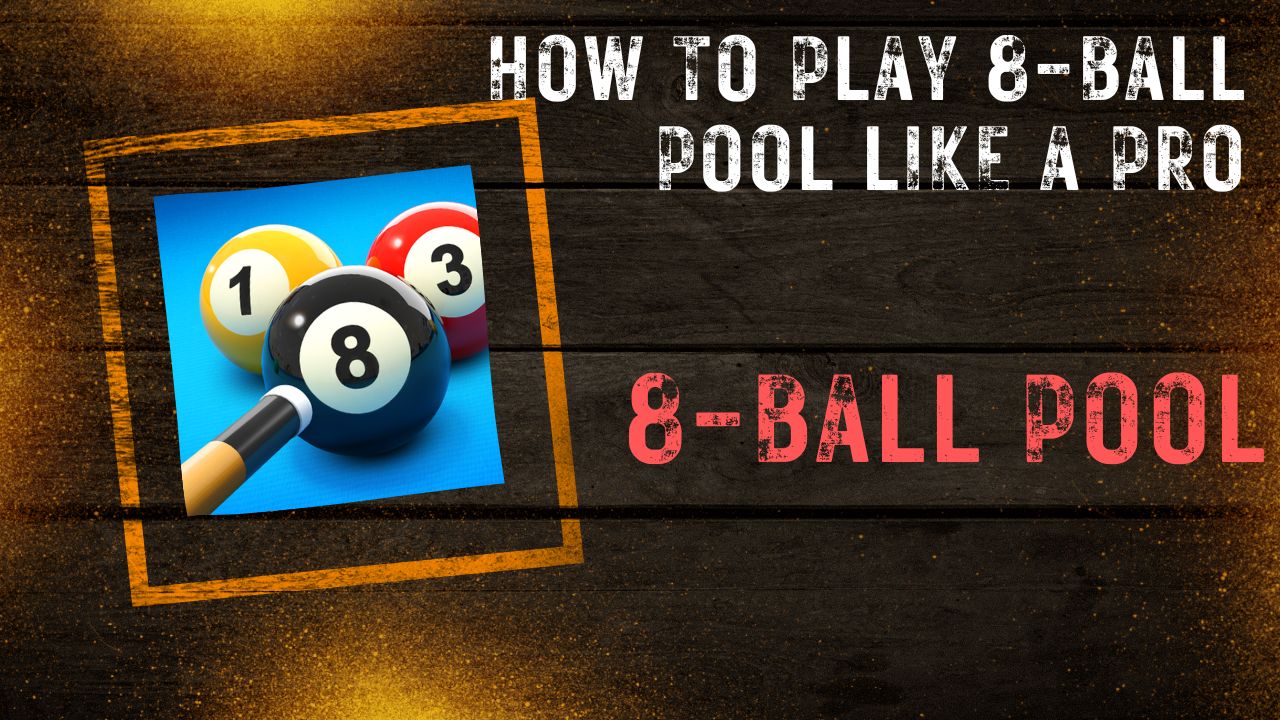
8-Ball Pool: The Ultimate Guide to Mastering the Game
Outline
- Introduction to 8-Ball Pool
- What is 8-Ball Pool?
- Brief History of 8-Ball Pool

- Basic Rules of 8-Ball Pool
- Objective of the Game
- Understanding the Pool Table Layout
- The Equipment You Need
- Pool Table Specifications
- Choosing the Right Cue Stick
- Other Essential Accessories (Chalk, Gloves, etc.)
- How to Set Up an 8-Ball Pool Game
- Rack the Balls Correctly
- Breaking the Rack: Tips and Tricks
- Understanding the Game Terminology
- Solids vs. Stripes
- Cue Ball, Object Ball, and Pocket
- Key Strategies to Win
- Defensive vs. Offensive Play
- Positioning the Cue Ball
- Mastering Pool Shots
- Common Types of Pool Shots
- How to Perform a Break Shot
- Perfecting Bank Shots and Combos
- Common Mistakes to Avoid in 8-Ball Pool
- Fouls and How to Avoid Them
- Over-aiming and Misjudging Angles
- Etiquette and Sportsmanship
- Playing Fairly and Respecting Opponents
- Pool Room Etiquette: Dos and Don’ts
- Advanced 8-Ball Pool Tactics
- Safety Shots and Tactical Play
- The Art of Spin: Applying English to the Ball
- Practicing to Improve Your Game
- Effective Practice Drills
- Using Online Platforms for Practice (8-Ball Pool App)
- How to Compete in 8-Ball Pool Tournaments
- Preparing for a Tournament
- Tournament Rules and Regulations
- 8-Ball Pool Variations
- Different Versions Played Around the World
- International Rules vs. Bar Rules
- The Role of Mental Focus in 8-Ball Pool
- Staying Calm Under Pressure
- Visualization Techniques
- Conclusion and Final Tips
8-Ball Pool: The Ultimate Guide to Mastering the Game
Introduction to 8-Ball Pool
8-ball pool is one of the most popular billiard games played around the world. Whether you’re playing casually with friends at a bar or in a professional tournament, the game offers a thrilling combination of strategy, skill, and focus. But what exactly is 8-ball pool, and how do you master it?
8-ball pool is a cue sport where two players compete to pocket either solid-colored or striped balls before sinking the all-important black 8-ball. It’s played on a pool table with six pockets, using a cue stick to strike a cue ball that then hits the numbered object balls. The objective is simple but requires a deep understanding of angles, spin, and positioning.
Basic Rules of 8-Ball Pool
Objective of the Game
The main goal in 8-ball pool is to be the first player to legally pocket all of your group of balls (either solids or stripes) and then sink the 8-ball into a designated pocket. The player who does this wins the game. However, sinking the 8-ball prematurely or committing certain fouls can result in an automatic loss.
Understanding the Pool Table Layout
The pool table is divided into several parts: six pockets (four at the corners and two in the middle of the long sides), the foot spot where the balls are racked, and the head spot where the cue ball is placed for breaking. Understanding this layout helps in planning your shots and navigating the game.
The Equipment You Need
Pool Table Specifications
A standard pool table comes in different sizes, but the most common is 7, 8, or 9 feet long. The table is covered with a felt-like material and has cushions (bumpers) along the sides to help rebound the balls.
Choosing the Right Cue Stick
A good cue stick can make a big difference in your gameplay. Choose a cue stick that feels comfortable in your hand, typically around 57-58 inches in length. The weight of the stick also matters, with most players opting for one between 18-21 ounces.
Other Essential Accessories
Accessories like chalk, gloves, and cue tip shapers are also important for consistent play. Chalk helps the cue stick grip the ball, reducing miscues, while gloves ensure smooth movement during the stroke.
How to Set Up an 8-Ball Pool Game
Rack the Balls Correctly
To start a game of 8-ball pool, the balls need to be arranged in a triangular formation using a rack. The 8-ball is placed in the center of the triangle, while the front ball is placed on the foot spot. Solids and stripes should be alternated throughout the rack.
Breaking the Rack: Tips and Tricks
The break shot is crucial in setting the tone of the game. A powerful break can result in pocketing multiple balls and controlling the game from the start. Position the cue ball behind the head string and aim slightly off-center for the best results.
Understanding the Game Terminology
Solids vs. Stripes
In 8-ball pool, balls numbered 1-7 are solid-colored, while balls numbered 9-15 are striped. Players are assigned either solids or stripes based on which type they first pocket.
Cue Ball, Object Ball, and Pocket
The cue ball is the white ball that players strike with the cue stick. The object balls are the numbered balls that you aim to pocket. Each shot involves hitting the cue ball to target an object ball and direct it into a pocket.
Key Strategies to Win
Defensive vs. Offensive Play
Sometimes the best offense is a good defense. While it’s tempting to pocket balls quickly, it’s important to think ahead and set yourself up for future shots. Blocking your opponent’s path to their balls or hiding the cue ball behind other balls are excellent defensive moves.
Positioning the Cue Ball
Controlling the position of the cue ball after each shot is essential to your success. By carefully planning where you want the cue ball to stop, you can ensure an easier next shot.
Mastering Pool Shots
Common Types of Pool Shots
There are several types of shots in 8-ball pool, including straight shots, bank shots (bouncing the ball off a cushion), and combination shots (hitting one ball to strike another into the pocket).
How to Perform a Break Shot
A good break can make or break your game, quite literally. The key to a strong break shot is to hit the cue ball with power while maintaining control, ensuring that you strike the front ball squarely.
Perfecting Bank Shots and Combos
Bank shots are incredibly useful for difficult positions, while combo shots can help when direct shots aren’t available. Both require practice to execute consistently.
Common Mistakes to Avoid in 8-Ball Pool
Fouls and How to Avoid Them
Some common fouls in 8-ball pool include failing to hit your own ball first, pocketing the cue ball, or hitting the cue ball off the table. To avoid these, practice precision and remain aware of the rules.
Over-aiming and Misjudging Angles
Over-aiming is a common beginner mistake. Trust your instincts and avoid overthinking each shot. Misjudging angles also happens often; always consider how the cushions and the ball’s spin will affect the shot.
Etiquette and Sportsmanship
Playing Fairly and Respecting Opponents
Pool is as much about mental sharpness and courtesy as it is about physical skill. Always respect your opponent, follow the rules, and avoid unsportsmanlike conduct such as sharking (deliberately distracting or confusing your opponent).
Pool Room Etiquette: Dos and Don’ts
When in a pool hall, be mindful of your surroundings. Keep quiet when others are shooting, and don’t walk in front of someone mid-shot. Clean up after your game, and avoid hogging tables if others are waiting.
Advanced 8-Ball Pool Tactics
Safety Shots and Tactical Play
In advanced play, safety shots are used to prevent your opponent from making their next shot. A well-executed safety leaves the cue ball in a difficult position for your opponent, forcing them into a tough shot or foul.
The Art of Spin: Applying English to the Ball
Using spin, or “English,” allows you to control the cue ball’s movement after it hits the object ball. Mastering top spin, backspin, and side spin can give you an edge in positioning and shot-making.
Practicing to Improve Your Game
Effective Practice Drills
Practice makes perfect. Focus on drills that improve your accuracy, cue ball control, and shot planning. Repetition builds muscle memory, helping you perform under pressure.
Using Online Platforms for Practice (8-Ball Pool App)
There are many online apps that allow you to practice 8-ball pool against players around the world. This can be a great way to improve your skills and learn from others.
How to Compete in 8-Ball Pool Tournaments
Preparing for a Tournament
Competitive pool is a different beast compared to casual games. To prepare for a tournament, focus on both your physical and mental game. Play against skilled opponents and simulate tournament conditions to get comfortable under pressure.
Tournament Rules and Regulations
Tournaments may have slightly different rules compared to casual play, such as stricter regulations on fouls and shot timing. Be sure to familiarize yourself with these before entering.
8-Ball Pool Variations
Different Versions Played Around the World
Different regions may have their own twists on 8-ball pool. For example, in some countries, the black 8-ball must be pocketed in the same pocket as the final ball, while others may have additional rules around the break.
International Rules vs. Bar Rules
“Bar rules” or “house rules” can differ significantly from official tournament rules. Always clarify the rules before playing in a new venue to avoid confusion during the game.
The Role of Mental Focus in 8-Ball Pool
Staying Calm Under Pressure
Staying calm is essential, especially in high-stakes situations. Deep breathing and visualization techniques can help you maintain your focus and block out distractions.
Visualization Techniques
Before taking a shot, visualize the entire process from aiming to pocketing the ball. This mental practice helps reinforce muscle memory and increases confidence.
Conclusion and Final Tips
Mastering 8-ball pool takes time, patience, and a lot of practice. Whether you’re just starting or looking to take your game to the next level, focus on the fundamentals, build your strategy, and most importantly, enjoy the process. Pool is a game of precision and patience, but with consistent effort, you can become a formidable player.
FAQs
- How long does it take to become good at 8-ball pool?
It varies, but with regular practice, you can start seeing significant improvement in a few months. - Can I use any cue stick for 8-ball pool?
Yes, but using a cue stick that suits your style and grip will give you an advantage. - What is the best way to improve my pool skills?
Practicing regularly, focusing on cue ball control, and playing against better opponents are key ways to improve. - Is there a difference between bar pool and tournament pool?
Yes, bar pool often uses “house rules,” which can differ significantly from the standardized rules used in tournaments. - What should I do if I get nervous during a game?
Try deep breathing and focus on one shot at a time. Visualization and staying present can also help reduce anxiety.





